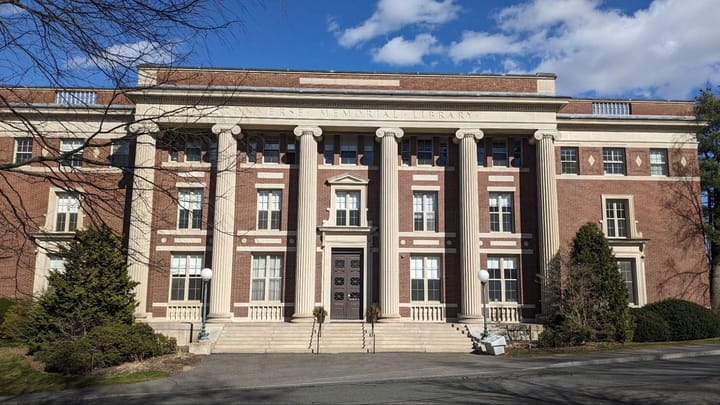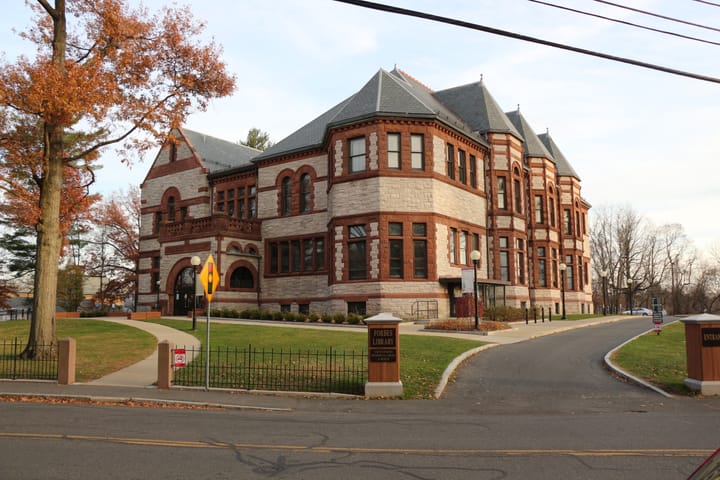In Wake of COVID-19, Chinese International Students Carry Heavy Burdens
Last month, when Crystal Zhou’s ’21 friend began making plans to head to New York City, she told him to wear a face mask, given the number of confirmed coronavirus (also known as COVID-19) cases in the city.
Her friend, who is Chinese, responded, “Well, I don’t want to be shoved off into the subway.”
Eddie Shen ’20 had similar conversations before traveling to New York City last week. Several of his friends visited large metropolitan areas like New York City and Boston — both of which have reported relatively large numbers of coronavirus cases — for job interviews. “Our point of discussion was: ‘Should I put on a mask?’” he said. “If I put on a mask, which probability is higher: the chance that I’m going to get beaten up by somebody or the chance that I’ll get the virus? So far, honestly, it seems much more likely that I’ll get beaten up.”
He did not wear a mask while in New York.
Since the outbreak of the coronavirus began accelerating in January, Chinese international students have borne the brunt of its impact. Students like Zhou and Shen track COVID-19 every day, concerned about its potential interaction with family and friends who are now quarantined back home. But that’s not the only thing they’ve had to worry about.
Anti-Asian racism and xenophobia are on the rise in the U.S. — Chinese restaurants around the country are losing business while a man was videotaped assaulting a mask-donned Asian woman in a New York City subway station on Feb. 5. For Chinese students — and Asian and Asian American students as a whole — this period of time has been particularly testing. The turbulence of not knowing what will happen feeds into everyday life.
“It’s a lot of grief, because it hits close to home,” Shen said. “It’s literally at your doorsteps.”
The Initial Outbreak
Every day, Ariana Lee ’20 Googles “coronavirus.” Every day, Sophie Pu ’20 tracks its numbers. Every day, Zhou follows its reach around the world. Each has had to grapple with the coronavirus in her own way.
When it was confirmed that someone had returned from Wuhan, the epicenter of the outbreak, to her hometown in Xinjiang, Zhou and her family immediately left their home in search of face masks and other supplies. They went from drug store to drug store until they’d visited 15 stores in total — the masks were all gone. “You walk in and you don’t even have to ask,” she said. “They tell you to turn back around.”
One week before airlines began suspending flights to and from China, Zhou left for the United States. Shen and Sophie Pu ’20, too, flew out of China in the nick of time.
Pu first landed in Seattle, like Zhou. Getting through customs took 90 minutes. When she lined up at the desk, the officer’s inquiry included numerous Wuhan-related questions.
Shen, Pu and Zhou all call themselves lucky. Lucky for being able to leave. Lucky for being able to enter the U.S. Lucky for being able to return to Amherst College.
Zhou said many of her friends who also attend college are trapped in China. One of Shen’s friends, a Smith student, is stuck in Wuhan.
Upon learning that Colby College was quarantining all students returning from mainland China, whether they displayed symptoms or not, Zhou felt “fortunate” that Amherst didn’t do something similar and that she wasn’t targeted just because she came from China.
Lee had returned to Amherst early on over winter break and could only rely on media and news reports to follow the coronavirus as it spread across China. It was difficult and anxiety-inducing at times because she couldn’t tell if outlets were being sensationalist in their coverage or how worried she should be. It was hard to know what was true and what wasn’t.
She read about shortages of masks. She read about the jump in prices for food. She messaged her high school friends about the virus every day.
Zhou, Pu, Lee and Shen’s families are all quarantined in their cities, Xinjiang, Shanghai and Beijing, respectively. Food is delivered to the door, people have to leave a record of when they leave their homes, schools are postponed and officials patrol the street to monitor transportation.
“My parents and my family are getting serious cabin fever at this point, but they’re trying to find things to do,” Pu said.
Zhou is particularly worried about her grandparents, who are alone and more at risk, being older.
Lee’s parents, however, were traveling in New Zealand when China started shutting down cities. They’ve faced the dilemma of whether or not to return to their home in Beijing for multiple reasons. But her parents, who are currently “living on a farm with sheep,” can only stay in New Zealand until April 6, when their tourist visas expire.
The outbreak is also weighing heavily on the minds of Chinese Americans. Emily Ye ’20 is one of many students with family in mainland China. Most of her family reside in Shanghai and Hangzhou, which are near Wuhan. She worries every day for their wellbeing.
Shen says he is thankful that his family is safe, but he worries about his friends in Wuhan, some of whose parents are working as doctors to fight the virus. “When you live it out yourself day by day, it’s totally different,” he said. “Every single hour without masks, without protective gear, without food for doctors in Wuhan is devastating. And they are the people who have to live it out, second by second.”
People in more rural areas or who are non-citizens are also suffering without access to necessary resources. Shen added that some in the U.S. may consider the measures taken extreme, but “in the face of death, literally, we would obviously gladly take this over having a virus spread to an untrackable degree.”
Back at Amherst
On Jan. 28, the first week of classes, Chinese international students received an email from Dean of Students Liz Agosto with the subject line “Outreach: Coronavirus.” In her email, Agosto extended her support and acknowledged the uncertainty of the situation. “I know it can be difficult to be far from home and that there are a lot of unknown questions about this infection. In addition, the news coverage may be overwhelming,” she wrote. “I hope that any loved ones in China continue to remain healthy and well.”
Agosto sent an email on Jan. 28 to the larger college community that documented symptoms of the illness and best practices for getting sick. President Biddy Martin followed up with an email on Feb. 26 in which she expressed support for impacted students and disavowed any bias or prejudice.
The potential for prejudice has cropped up repeatedly for Asian students, however. When Zhou first came back to the U.S., she made it a point to restrain her cough, worried that if she coughed, “Someone’s gonna like, give me a look.”
Ye did receive such a look. Over the weekend of Jan. 30 to Feb. 1, Ye traveled to San Francisco for a job interview. That weekend, Santa Clara County confirmed a case of COVID-19. On her flight back to Amherst, Ye sat down next to a white woman. She looked at Ye and immediately reached into her bag, pulling out a mask that she wore for the entire duration of the flight.
No student interviewed has faced overt attacks, but online, Zhou, and everyone else interviewed, has picked up on “a lot of hate” against Asian, specifically Chinese, people, as she said.
On Instagram, reputable influencers have made posts saying, “The Chinese deserve this because they eat bats.” Other accounts have made anti-Chinese comments and jokes about the virus. “I think that’s what’s been more frustrating, is just seeing people who have a lot of influence on social media saying these things,” Lee said.
Moreover, a whole host of politics has accompanied discussion of the coronavirus, which often results in Sinophobic comments. Ask yourself: “When you’re critiquing another country, are you critiquing or being racist?” Pu said.
At Amherst, Zhou, Shen, Lee and Pu feel relatively shielded from racially motivated attacks.
Though they all said people in Amherst are more sensitive to race-related issues, it hasn’t prevented some college community members from trivializing the situation.
On Feb. 26, AC Bar Night, an anonymously-run listserv that sends weekly emails to seniors about getting together at local bars, sent an email with the subject line: “Grab a Coronavirus and Lyme Disease.” The content of the email made light of the outbreak and triggered immediate backlash. Within an hour of sending it out, the account managers followed up with an email apologizing for their actions.
“It was really upsetting because … you’re equating it with a bar night event where people get drunk, and it’s a stupid situation,” Lee said. “I’ve literally been Googling coronavirus every single day because it’s something that’s very much on my mind … and the fact that you’re trivializing and joking about something that is affecting students on campus and their families is really upsetting.”
Initially, Shen was angry, but then he felt sad. The anger couldn’t change anything, he said, “because this is essentially what Asian Asians and Asian Americans are going through every day.”
“We’re on the fringe, if at all, of the social justice narrative,” he added. “This is just a trigger that leads to eruptions that reveals underlying problems, just similar to all the conflicts and tensions that we’ve seen in this country for the past four years. There’s not much to say about it except that it’s wrong, and the process of changing people’s perceptions and their comprehension of people who don’t look like them is unfortunately going to take a lot of time and blood and tears in the states.”
The AC Bar Night email, Shen said, reflects Americans’ inability to grasp the gravity of the outbreak. Every person interviewed was surprised by the way people in the U.S. are dealing with the coronavirus. Most American friends, Pu and Shen said, think of it as a stronger flu.
“It seems like a common sentiment among like Chinese people or people who have family in China or South Korea, that people in the States and people here aren’t really reckoning with it as seriously as they should be,” Shen said. “People don’t realize that it actually impacts individuals on this campus, not just people who are studying abroad.”
Ye’s parents have been warning her about the virus since mid-January, and she said other Asian and Asian American friends have had similar experiences. “Meanwhile, I was talking with white friends about the virus, and they said that they didn’t start getting concerned until very recently after the outbreak in Italy,” Ye said in an online interview. “It reminded me of how during the initial outbreak, there were some ridiculous, xenophobic theories that only Asian people could get the virus — we’re not a different species.”
Zhou originally planned on attending a coding conference in Boston this month. When she told a faculty member she was concerned about whether the conference should still happen, given its gathering of people across the nation, the faculty member told her, “You’re overthinking.” For Zhou, that was equally as hurtful as a xenophobic remark. “It almost diminishes people’s experience in China and the consequences happening in China by saying, ‘Oh, it’s nothing. You’re worrying too much,’” she said.
Upon returning to Amherst, Shen said a number of campus community members took the time to ask him how his family was doing and how he was feeling. He has felt supported by the college, he said, though he had one bone to pick regarding the college’ first official acknowledgement of the coronavirus and its impact on students. That email was not sent around the initial outbreak in China; it was sent after the first few cases in the U.S. were confirmed. “This is America, right? It’s 90 percent of the campus community,” Shen said. “But I feel like we could have done better in that regard.”
Lee also took issue with the college’s communications about the coronavirus because the college’s firsthe first community-wide email only detailed health risks and read like a medical report, without discussing support for affected students or the ongoing racism and xenophobia related to the virus, she said. Though Martin’s later email did contain more along those lines, Lee said it focused heavily on study abroad students without much attention to the discrimination that has come out of the outbreak.
In recent weeks, the college has taken more and more precautionary measures on campus, but Associate Dean of Admission Xiaofeng Wan, who oversees admissions in China, said the college maintains its commitment to admitting students from China and other affected countries. Lisa Rutherford, chief policy officer and general counsel, added that the college will work with all admitted students who hope to enroll “to do everything we can to have them begin as students in the fall.” If unable to do so, the college will work with the student to defer their enrollment.
What Happens Now?
As the campus community reels to respond to the implications of Martin’s March 9 email detailing the need for online learning and for students to leave campus, Pu, Shen and Zhou, felt relieved by the measures taken by the college. “I think I finally start to feel a modicum of safety, and I’m so, so glad that the college is taking actions so quickly,” Pu said. “But I completely understand why some students might find this problematic.”
“While it obviously causes inconveniences for almost everyone, I think they are doing the right thing under absolutely correct reasoning,” Shen said. “I just hope the petitions will work out though since many people, including myself, can’t afford to leave campus for various reasons. I think they should also prioritize last-semester seniors since I’m sure everyone has a lot on the line — theses, labs, post-grad plans, etc.”
Lee, on the other hand, said the college still isn’t addressing the racial implications of the coronavirus. Such drastic measures also bring up a whole host of other questions, she said. “What’s going to happen to Chinese international students?” she said. “I know there’s a petition, but what about students who are low-income or have other marginalized identities? … It seems more like oppression Olympics.”
Uncertainty of the future still looms over Chinese international students. Even if they’re allowed to stay on campus, no one knows if they’ll be able to return home once summer rolls around. “Should I buy my ticket home?” Zhou said. “There’s no way of knowing. You just hold on and wait to see, but it’s scary … It’s just hard to tell whether in August or in June, things will start stabilizing.”
Pu is currently trying to apply for Optional Practical Training, a one-yearlong student visa, as well as a long-term visa. During this process, Customs and Immigration discourages leaving the U.S. If school is cancelled, it’ll impact her graduation date and affect her visa application.
For international students to renew visas, Pu added, applicants have to return to their country before re-entering the U.S. What will happen to Chinese students whose visas are expiring soon? And what will happen to Chinese international students who are admitted to Amherst College’s class of 2024? There are more questions than answers.
“After sort of a month thinking about coronavirus every day, I think what has become the most scary is not the virus itself, but sort of the uncertainty around it and the powerlessness around it, because there’s truly so little that could be done as an individual and as a foreigner,” Pu said.
Zhou knows Amherst cares. But she worries about the lack of policy on how the college will help Chinese international students.
She worries even more about what she sees as America’s inadequacy in responding to the virus, with government officials playing it down, shortage of testing kits and fees for treatment. “My mom is more worried about me here in the U.S.,” Zhou said with a laugh.
Lee encouraged the campus community to be mindful that students are directly impacted by the coronavirus and are constantly in a state of concern. She asked that people be aware of the “racial implications of this disease and how it’s also affecting Asians and Asian Americans at large.” Even if they don’t have family in China, they will face racist, discriminatory remarks because of their race and the way the media have portrayed the disease, Lee said.
The college should do what it must, Shen said, but with students prioritized when possible. “I really hope that there are alternatives and options for students to minimize their disturbances and their personal plans, especially for seniors,” Shen said. “There are very high stakes for sure.”





Comments ()